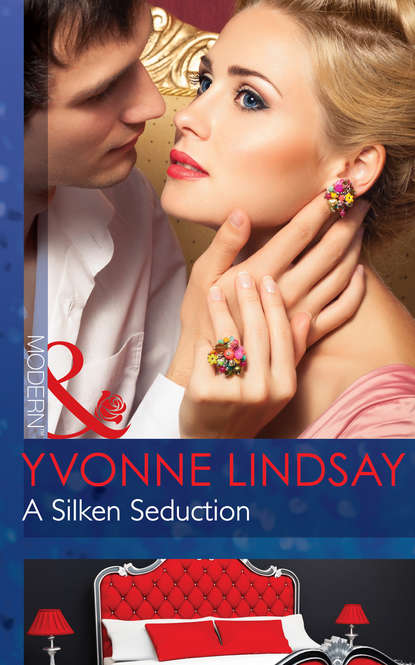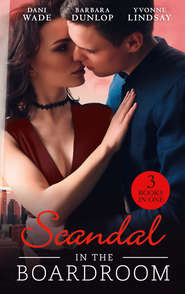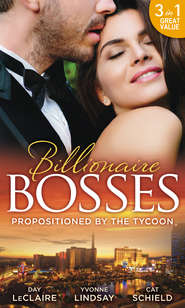По всем вопросам обращайтесь на: info@litportal.ru
(©) 2003-2024.
✖
A Silken Seduction
Автор
Год написания книги
2019
Настройки чтения
Размер шрифта
Высота строк
Поля
“He’s with Waverly’s. I don’t doubt they’d do a very professional job, but as to my reason for not wanting to sell, it’s personal,” she answered, not bothering to hide the note of irritation that tainted her words.
Ted Wells cracked a half smile and nodded. “Personal is good enough. I’ve heard of Waverly’s, they seem to know their stuff. You know, if this guy is with them, maybe you should ask him to help you track down that statue you’ve been looking for. With his contacts he might be able to succeed where you’ve struggled to find information in the past. Plus, if he’s willing to help you, it might show whether his character is true.”
Avery considered his words. As old-fashioned as the term character was, Ted very well might be right. She suddenly felt churlish for sounding so annoyed just a moment ago.
“Look, I’m sorry if I sounded rude.”
“No problem, you don’t want to let the collection go. That’s fine.”
“Sometimes I feel like it’s all I have left of my father, y’know? He loved it so much,” she found herself blurting out.
Compassion filled the older man’s eyes. “You think he didn’t love you as much?”
His words pulled no punches, they forced Avery to search deep into her heart for the truth. Sure, there’d been times when she’d felt unloved, what child didn’t at one stage or another? Perhaps her father hadn’t been as demonstrative as she would have liked, perhaps he’d been distant but he’d still been her father. Deep down, she knew he had loved her.
Ted bent to clear a section of weeds that poked through a herbaceous border and continued talking without waiting for her reply. “Paintings are only things. I’m pretty sure that your dad’s love for you was more than just a thing. I was never lucky enough to have kids, but I’d hope that if I had they’d know that no matter what, my love was something they could hold in their hearts and minds forever. Love’s like that, y’know?”
There was more than a grain of truth in what Ted said.
“So you think I should let them go?”
Ted shrugged and reached for the shears hanging on his belt loop, taking his time to snip a couple of dead stems off a nearby hydrangea. “That’s not for me to say. From what you’ve told me before, I’d hazard a guess that your father’d be sorry if he knew the paintings weren’t able to be appreciated by people who’d enjoy them like he had.”
There was something soothing in the measured way Ted spoke. Even though they’d only met online before today, and shared the briefest of phone calls establishing when he could start work in the garden, she felt as if he’d been around for a whole lot longer.
Avery sighed. “You’re probably right. I just don’t know if I’m ready.”
Ted nodded. “You’ll know when, or even if, it’s the right time. They say Waverly’s is supposed to be one of the best so, if you do decide to sell, the collection will be in the right hands when the time comes. In the meantime, think about getting that young man of yours to find the angel for you.”
“Oh, he’s not my young man,” she protested. Not yet, anyway, a tiny voice whispered inside her mind. “But I’ll think about your suggestion. Thanks.”
“Anytime,” he said, gathering up the weeds and cuttings and loading them into a wheelbarrow. “If you need me I’ll be working around the front of the house for a few hours.”
When he was gone, Avery turned to her painting, giving it her most critical eye. Marcus had been one hundred percent right about what was wrong with it. Not to mention his observation that her heart wasn’t fully invested in the rendition of the garden. She let her gaze wander to the spot where the angel statue had once stood, seeing it as clearly in her mind’s eye as if it hadn’t been gone for the past nineteen years. The soft, almost fleshlike tones of the marble, the graceful sweep of the angel’s wings, the way the arms had curved gently in the air as if plucking some precious unseen thing from the sky.
Without thought she reached for her palette and her paintbrushes, hooking them both deftly with her thumb as with her other hand she squeezed tubes of paint onto the scarred and paint-stained wooden surface of her palette. Time lost all meaning as she started to paint, putting back what should never have been lost all those years ago. Vaguely she was aware of Mrs. Jackson’s call that her morning tea was on the terrace, but she continued to work, oblivious to time and the gnawing ache that started to grow in her stomach.
* * *
Marcus strolled along the path toward the garden where the housekeeper had told him Avery had been painting all morning. He sensed he’d made an ally when, after hearing her muttered comment about Avery not eating yet today, he’d said he’d make sure she came in for lunch.
Bees buzzed from bloom to bloom along the path, collecting the last of the pollen. Marcus had never really stopped to consider the seasons before. His life in New York was busy, sometimes even frenetic, and the change of seasons was, for him, marked by how heavy his coat was and how disrupted, or not, traffic was by snow. Stepping into this garden made him more aware of time passing, of how some things such as the spent annual plantings were at their end and of how other plants would continue on, forever green no matter the season.
It was philosophical thought of the type he didn’t usually indulge in, but with it came the strong reminder that nothing remained the same—ever. If life could be defined by seasons, his grandfather was well into his autumnal years. Which didn’t leave Marcus a great deal of time to restore Lovely Woman to where it belonged.
He’d been honest with Avery last night when he’d said that he’d started the evening with a specific motive but that motive had faded into obscurity when he found himself purely enjoying her company. But he couldn’t afford to be so distracted, not again.
Avery paused in her work as he drew near and, still unaware of his approach, stepped back to gain a fresh perspective on what she was doing. He could see she’d been busy on the painting, and her skill was apparent in the improvements he could see even from this distance.
“That’s looking great,” he commented as he drew alongside her.
She turned to him with a happy smile on her face. “It just feels right now. Thanks for your suggestions yesterday.”
“I don’t remember suggesting this,” he said, pointing to the angel statue that now formed the focal point of the canvas. “It’s not a part of the garden, but it seems to belong here in the picture.”
“That’s the point.” She sighed. “It does belong there.”
Her face took on a melancholy expression that saw his protective instincts rise firmly to the fore again. “It makes you sad—why?”
“The angel statue was a wedding gift to my parents from my mother’s family. I don’t know exactly how old the statue was, or where it came from originally. My father sold it after my mother died. Too many painful memories for him, I guess. I was five then, and I got really upset when I realized it was gone.”
“Unusual for a five-year-old to get so upset about a statue,” Marcus commented, struck by her sudden vulnerability.
She shrugged. “I suppose I was a bit unusual. I know I was a lonely child, except when I was out here, in the garden, with my imagination. My mother was ill for most of the time I knew her and in the six months before she died I was pretty much left to my own devices.”
His indignation must have shown on his face because she hastened to elaborate.
“Don’t get me wrong. There were plenty of staff assigned to my care. I had a nanny, and Mrs. Jackson was already the housekeeper here back then and she used to look out for me all the time.”
“What about your father?”
“He spent as much time as he could with my mother. They were devoted to each other.”
Marcus turned away. He found it a stretch of the imagination that a couple could be so devoted to one another that they neglected their only child. It was no better than his own parents, who’d been so selfish and enslaved by drugs, needing his grandfather to take care of him. Either way, it wasn’t right.
“You spent a lot of time in the garden?” he forced himself to ask.
Avery nodded, a nostalgic smile on her face. “It was my wonderland. I could hide with my coloring pencils and my paper under the tree over there, and when I needed to talk to someone, the angel was always there to listen.”
Suddenly he understood why she had been so distraught when the statue had been taken away. She was an only child and, obviously, a very solitary one. It had been her friend.
“What happened to it?”
“Dad put it in the hands of his broker who found a buyer for it straightaway. By the time he found out how upset I was about it being gone, it had already changed hands again, and the seller didn’t have the contact details for whomever purchased it. I have no idea where it is now, or even if it still exists.”
She put her palette and brushes down then stretched her neck and rotated her shoulders, as if working out the kinks. His hands itched to reach out and massage them for her, to ease the taut muscles and replace her tension with something else. He fisted his hands and pushed them into his trouser pockets.
“Have you looked for it?”
“Oh, yes.” She nodded vigorously. “Dad kept the bills of sale for everything that he bought or sold over the years, together with full descriptions of each item—it makes up quite a history when you go through them all. But even with copies of the identifying marks and old photos, I haven’t been able to find a trace of it. I even set up message boards on several art and antiquities sites asking for help, but no luck.” She laughed. “Oh, except in finding a new gardener!”
Вы ознакомились с фрагментом книги.
Приобретайте полный текст книги у нашего партнера:
Приобретайте полный текст книги у нашего партнера:











